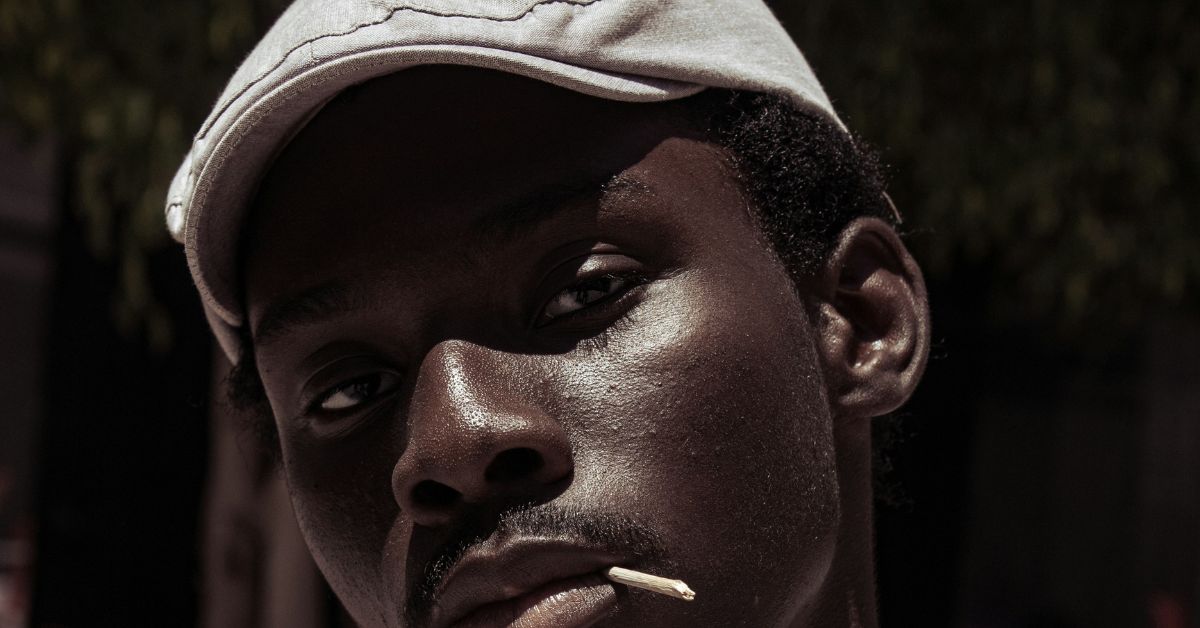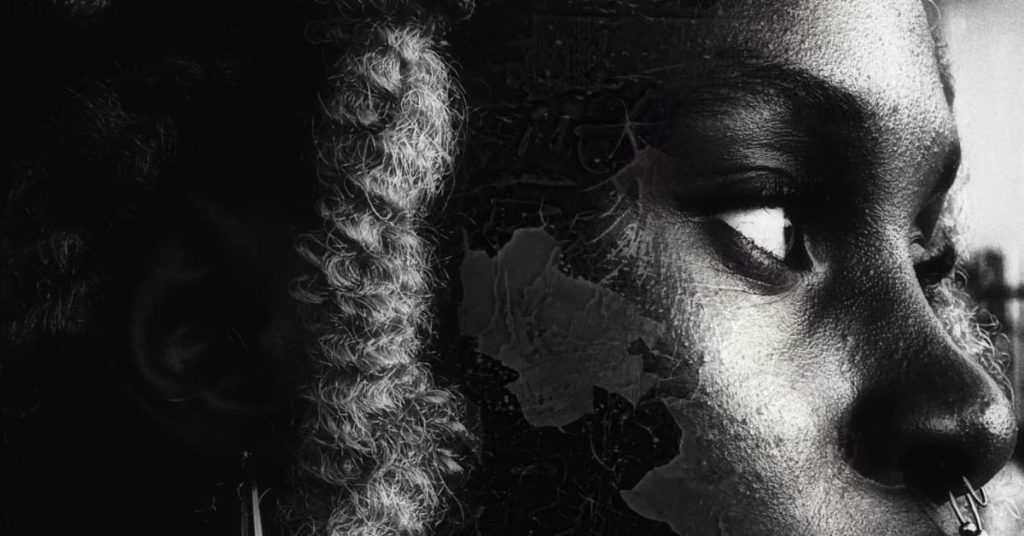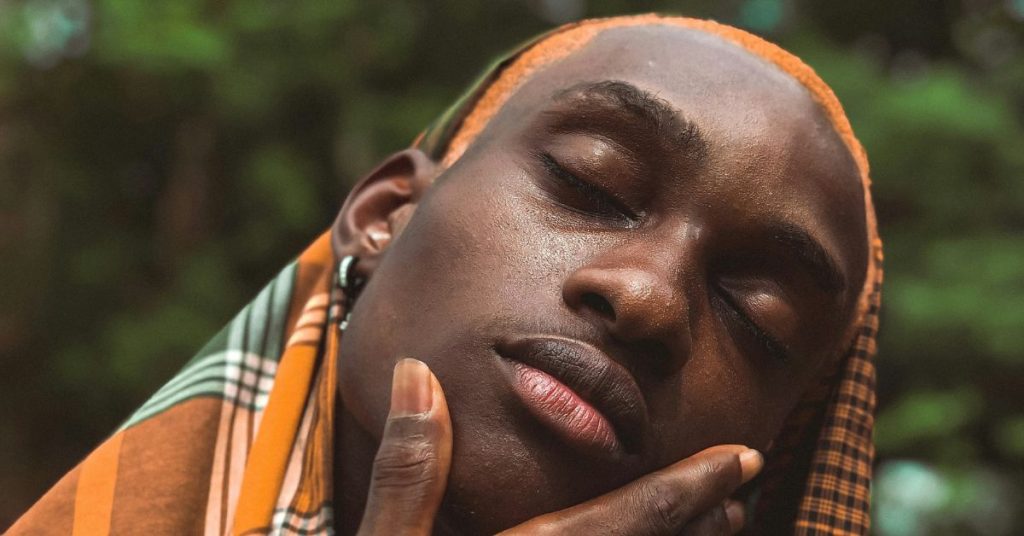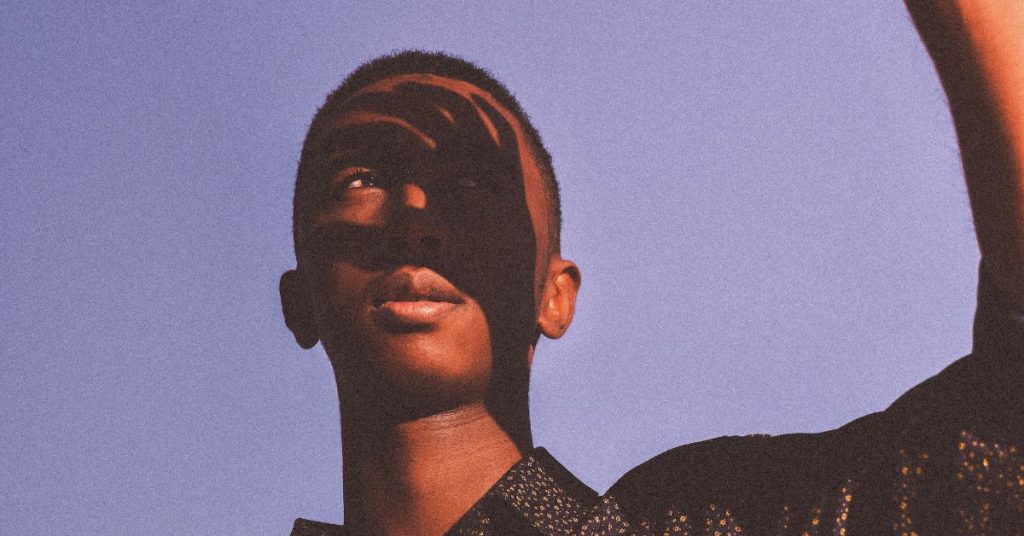Cover Image: Christian Agbede on Unsplash
Miracle let out a soft, melodious hum of satisfaction, much like his late, lively father, as he bit deeper into his cousin’s head. A crimson stain grew on the carpet like a pretty blossoming rose. The little girl’s body twitched, causing him to hold her closer, tighter.
He had been starving for days. It was Nanshin’s fault. She had wasted too much time.
Nanshin hobbled over to her 7-year-old son in an old, tired, familiar pain and laid a hand on his small head. Stumbling upon a scene like this can be unsettling for most, but this had become Nanshin’s life. Miracle was… different from most children his age. He was born into death and destruction. He was a product of his environment.
Seven years ago, a concoction of gunshots, piercing cries and triumphant shouts in scary tongues martyred the quiet of the night. A roaring, mechanical buzz cut through the breezy, wet air as the fat, black, metal belly of a helicopter hovered over the Zike community like a useless guardian angel.
It looked down on the great cloud of black smoke rising from burning, brown homes with screeching families inside and refused to descend. Instead, it observed, safely and slowly, flying over the little village, once, twice, and then away, into the heart of the night. Nanshin and her people were on their own.
“We have to go, Nanshin.” Sunday’s deep voice leaked panic like a broken sink.
NEPA had left them in deep darkness. Only Sunday’s old, metal torchlight illuminated the small living room. Its carton-brown couches matched the closed curtains Rotshak peered through.
“Rotshak, leave that place!” Nanshin yelled, rubbing her swollen belly instinctively.
He flinched, dropping the curtain to scamper to his Father’s side. He nibbled on his fingernails, tears brimming in his eyes. He was a spitting image of his father, now more than ever in their mirrored worry.
“Nanshin, please. We need to go, now.” His tone was soft but spiked with urgency.
She wanted to stay, hide, and pray. But even she knew there was no hiding from their evil bloodlust. They could only run.
Nanshin took his extended arm reluctantly, grunting as she stood from the sinking couch. He guided Nanshin and Rotshak out of the house with careful haste, looking for where danger might be hiding in wait for them. Burning homes lit outside bright orange. Ash and dust flowed in the warm, still air like American snow. They navigated through running friends, family and neighbours, covering their noses, chased by terror.
Suppressed coughs scratched Nanshin’s throat like an imprisoned cat. She wobbled like a walking drum as they headed for the farm, where the light of the ugly flames swallowing properties and loved ones did not reach.
“Sunday. Stop. Stop!” She dragged her wrist from his grip, halting by a tree whose head, lit by a close burning house, burned like a candle. “I will only slow you down. Carry Rotshak and go.”
“Mummy, no, please!” Rotshak sputtered through cries. Nanshin stared into Sunday’s eyes, afraid that if she looked at her little boy, her conviction would shatter. She pleaded with her husband’s stoicism, not the fire of emotion eating his chest raw.
Bright orange-tinted eyes darted from Nanshin, to the tongues of flames licking rusting cars and turning mud-brown houses black, its light bleeding deep shadows around them. When his eyes landed on her, it sparkled with fresh determination.
“I will die before I leave you.”
Shimmering tears blurred her husband’s hulking figure into mush. She nodded and blinked them away. There was only time to run. But black figures spattered with firelight, who cast death with the whip of their glinting machete, surrounded them.
Sunday pointed to the farm, dipped in darkness. “Run, Rotshak! Run!”
Rotshak took off into the night but did not reach far. Squeals of prayers from their foul mouths followed swings of iron and a fountain of red.
Hack. Hack. Hack. Rotshak’s neck splashed blood on the rough, sandy ground. Nanshin’s shrieks vaporised into the smoky rain of ash and chorused cries. Sunday held her face to his heaving chest. Their violent, careless theft of life curdled her gut. Nanshin and her people were merely animals to be assembled and slaughtered. Lesser beings to be rid of.
A spark, a bang and Sunday fell. His bulky frame looked so small in a crumpled mess beside Nanshin. Sound refused to escape her open mouth no matter how wide she opened it. She just stared at his splayed-out body soaking the sand with dark blood from a gunshot wound in his head.
In the same breath, a sharp metal tore her arm open. Agony and darkness seized her mind.
Nanshin plunged in and out of consciousness, and the suffering that accompanied it. Her belly raged with boiling pain. Foreign hands held her legs apart and her arm firm to the coarse ground. Hot, beading sweat stung her eyes. All her mustered strength squeezed into her shouts dribbled out in quiet yelps.
But then familiar bruised faces of neighbours, family, friends surrounded her. Fanning her, whispering ineffective soothing words to ease the sweltering agony between her legs and macheted arm. It gave little comfort. Her teeth cut her tongue. A metallic taste of blood filled her mouth, and her nails dug into the sand as she gave one final push.
Luckily, it was enough. In the ash of destruction came a miracle.
Miracle’s little cries were a dissonance to the wails that enveloped the village. Her vision of her little bundle of joy, draped in white, blurred at the brink of unconsciousness, even as blood and inconsolable howls seeped into the streets’ and homes’ nooks and crannies.
Days later, a great number dredged up will and slogged through miles to the next village, where safety was not guaranteed but offered. Nanshin refused. Her home, amongst a few others, managed to survive the hungry flames. She was not going to abandon it, despite the unsolicited ghost of happy memories that lived there now. For that though, she had her Miracle.
His little cries evoked teary smiles. The sight of him asleep— unperturbed and pure— silenced the bustling turmoil roiling inside her like a great storm silenced. However, Miracle wouldn’t suck. He was only weeks old, but his bites drew blood.
Nanshin’s concern rapidly matured into an ugly worry.
“Nanmaan used to bite me all the time when I breastfed her,” Nanshin’s cousin said. “I’d slap her mouth. But she outgrew it.”
“Kai! Relax now!” That was all Nanshin got when she tried to explain her peeled flesh. It wasn’t inconsiderate. It was just the extent of wisdom her cousin had to give. And so, she tried, again and again, but only had wounds to show for it.
Miracle’s bones began to show in his cheeks. His eyes sunk inwards, his arms thinned, and his loud cries intensified. But soon they grew worryingly faint. Luckily, the church’s sympathy was never exhausted. Troops of pretty smiles and strained intonated condolences in long white buses greeted the wounded and the mourning alike. Prayers, hugs, tears and relief materials were exchanged.
Nanshin made her way to a medical tent where a long-nosed doctor, swimming in his sparkling white coat, bore a smile warm enough to be welcoming but not too bright to be insensitive.
“My child bites me. He won’t suck. Only biting.” Nanshin said, propping her skinny child up as if to say there was evidence of the bizarreness of the situation. She spoke in a mosaic of English and Hausa jaggedly fitted together. But the doctor nodded with an understanding, tired smile.
They had been there for hours, attending to the ever-growing, snaking line of the sick stretching outside of the tent. And she was grateful to them for showing sympathy her government lacked.
But the doctor’s answer, however technical, was only a twin of her cousins. Nanshin left with a bag of pain killers, diapers, foodstuff, and an unceremonious picture of her taken, holding up her gifts and disappointment.
For the next few days, she fed Miracle all kinds of meat she could find, with and without seasonings, but to no avail. Then, one morning, no noise came from him. His little body tucked in her colourful wrapper lay too still on her bed. Heavy tears fell to her lips. Loutish sobs balled up in her throat. God wouldn’t take Miracle from her, too. Miracle was restitution for all He had taken from her.
Nanshin’s trembling hands lifted his frail body to her ears, praying for a sign of life. A trickle of breath tickled her ear. She sensed she knew what she had to do for a long time now, but did not want to admit it to herself. That her child was indeed “special,” and this wasn’t just going to pass.
She slid her finger into his mouth. He licked and sucked and bit down hard. Her pillow dampened her screams but did nothing for the pain of losing a finger. She tied a tourniquet on the wound and watched him munch on her flesh and crunch her phalanges.
Months turned into years, and Nanshin’s toes and fingers drastically reduced. But for Miracle it was enough. His laughter was a ward against the sadness that lurked in the walls. His smile, his circular face, his wide innocent eyes and animated silliness were uncanny to his father’s.
Once Miracle turned four, Nanshin lived in acute misery. Several toes and fingers were gone. Bits of bitten feet caused her to limp. Pieces of eaten buttock flesh made sitting difficult. Cut-out cheeks made eating a tumultuous task. But Nanshin wasn’t the only one enduring suffering. Even Miracle made sacrifices to eat below what he needed.
Nanshin had tried other ways. She’d stood before her family’s makeshift grave in the eye of the night, trembling from the weight of what she needed to do. It was an expanse of land hastily dug for unceremonious burials. It lacked dignity, much like what she was about to do. Through gritted teeth, she jabbed her hoe’s silver butt into the hard, stubborn soil. If her son were to feed on anyone, she’d have it be no one but family.
With each thrust, each chuck of sand to the side, unsullied, buried memories resurrected to assault her mind. Flashes of a machete in her little boy’s skull lit her spirit with ire like stacks of wood baptised in petrol. Images of her husband lying inhumanely crooked on the reddish-brown sand, leaking an absurd amount of red, soured her determination.
Cold sweat made tracks down her back. Her breath formed little clouds of mist in the chill harmattan air. Her hands shivered from fatigue. Aggressive weeping racked her lean frame. But she swallowed her sorrow and kept digging. For if she fed the death of her past to her little miracle, a new life would grow.
The stench of decay met her before the thin, rotting corpses, wrapped in filthy white, emerged from the dirt. Her sobbing dissolved into wailing as she lay next to her husband. A man once filled with unapologetically rambunctious laughter, reduced to food of the earth. And, next to him, her little Rotshak, once teeming with life and untamed dreams, now eaten from the inside by maggots.
She was loud as the grief could not be kept at bay any longer. She wallowed alone in remorse for being the lone survivor of the cruel night. No one came, even as the sun’s shiny bald head peeked over the mighty mountain tops. For in recent years, ravaging of the night’s quiet by loud, mourning souls was the new norm.
Nanshin sauntered home like a wounded animal, dragging rotten flesh in a tied cloth behind her. She would’ve been an odd sight in the grey morning, with a drunken stagger, a dirty hoe and a makeshift bag of putrid odour, if people were awake and about. She didn’t care. Part of her wanted to be caught, unburdened of this responsibility. And a bulk of her took her husband’s place in the shallow grave.
But as she stared down at Miracle’s tiny smile in the compact living room, she understood what little was left of her was mighty. She emptied her husband’s rotten remains onto the carpet before her toddler.
“Eat,” she croaked. It burned to speak, so she said little.
Miracle did not eat. He would not eat anything that wasn’t fresh. Nanshin did not leave her bed for days after that, the door shut to little crying Miracle. Only tears, snot and piercing pain to keep her company.
Nanshin, however, would not, could not, leave her son bawling for just a taste of flesh to squash his monstrous, gnawing hunger. So, she went out foraging nights later, settling upon the brukutu joint up the hill where mostly men drowned their melancholy in brown locally fermented wine, praying it never raised its ugly head again.
There, Tapshin was chosen. A happy man whose smile stopped before reaching his eyes since his sister was butchered four years ago. But his smiles towards Nanshin bore the ingredients of romantic intentions. It was flattering to her. Her conspicuous limp and bandages did not deter his charming advances. I am still a woman after all, she thought. Broken spirit and missing parts of herself, but still a woman.
Soon, with only keen familiarity of the road as a compass, they staggered home, trailing canopied trees and fat bushes, ominous in the half-moon-lit night. Their shy, soft, drunken, foolish laughter caressed the night’s humid air. His teeth and eyes shone in contrast to his skin. He is like Sunday in so many ways, Nanshin thought. Full of life with an aching yearning in his stare.
Nanshin looked away. She must focus on the task at hand. She took him by the hand and dragged him deep into the thicket. He did not protest. Motionless branches slapped against their sweaty bodies. Leaves crunched loudly into the cloudless sky. Their squeaky laughter drew Nanshin back to simpler times filled with teenage shenanigans.
Tapshin stopped, pulling her closer. Clammy skin on skin. His lips gently pressed against her cheeks, avoiding her wounds. His hands slid down her back to her behind. Tasting her salty tears, he pulled back a hair’s length to assess the situation. His slight gasp met her rising sobs as the kitchen knife she’d tied to her thigh, underneath her thin dress, slid into his abdomen.
“Forgive me, Don Allah.” She pleaded through snot and tears.
His muscly, dark figure crumbled to the ground, clinging to the wound in futile desperation. His breaths came faster. His eyes darted around, wide with fear. They landed on her lanky body, stood over him, knife dripping blood down on him.
Those eyes were a carbon copy of her sons before his skull was split open savagely. Her grip loosened on the crimson, sticky knife. Her knees threatened to buckle. Her lips quivered. Her vision blurred.
“Help! Somebody!” His shouts cut through every bit of creepy, crawling, contrite hesitation like a searing hot knife through cotton pillows.
Her knife came down upon him like swift justice. Again, and again and again. His groans turned into gurgles, but she would not stop. Warm blood spattered on her matte, sweaty, bloody hair-plastered face.
She stopped midwing, quaking, spittle falling onto the very dead man. She rolled over in a fitful of tears. Her body wouldn’t obey her commands to stop. To rise and go get her little Miracle.
“Forgive me,” she said over and over again, praying he could find the heart to forgive in the balm of the afterlife.
Crack.
Her sobs stuck in her throat. She lifted her head up, searching the darkness with short bated breaths. There it was again. The heavy, inauspicious crunch of stumping feet. Someone must have heard his call for help.
“Hello? Who’s there?” The voice was low, gruff and slippery with alcohol.
As it grew closer, yellow light slithered onto the withering grass and dying leaves around them. There was little time to think. There was no explaining her way out of this.
In a moment of epiphany, she hopped on Tapshin’s still body, placing the knife strategically where it could not easily be seen. She began a back-and-forth motion on him, regurgitating fake moans through choking sobs, praying shame would save her tonight.
The light brightened, chasing the night into deep shadows. It spread out over the thin trees and yellow-tinged grasses. The footsteps took on a distinct determination. Nanshin closed her eyes and pressed her chest down to Tapshin’s bloody body, never stopping, sweat threading down her thin cotton gown mashed to her overheating skin.
The light flashed down on her only for a moment before it quickly got turned away. The stranger muttered his hasty apologies and briskly, unsteadily, waltzed back the path, drawing a curtain of darkness over the bush once again.
Nanshin said a silent prayer of thanks to the hypocritical dignity of culture and tradition. Once the light turned into a spec and diminished altogether, Nanshin fell back down to the rough, hard earth and cried from a blend of self-disgust and revoltingly sweet relief.
She amassed what strength she had left and made her way to Miracle. She met him awake, eyes soaking the sight of her thin white gown soaked in sticky blood mashed to her sweaty, hot body. Her hair was plastered half haphazardly to her face, carved with an expression of unexplainable terror.
He didn’t seem to care. His drool had already begun to make a pool on the floor before she could get to him. That was the sacrifice he made. He would not bite her without her permission, no matter how difficult it was.
That’s how she was reminded her son’s love was worth sacrificing for, and she found solace in it. She hastened her steps back. His cold saliva dropped onto her wet back. His growls diminished into low whimpers.
She rubbed his back comfortingly. “Shhh… We’re almost there.”
The thicket cleared to reveal Tapshin’s bloodied body, half moonlight only now reflecting off his glassy eyes. Miracle wouldn’t eat. He groaned and moaned and whined and said, “It isn’t fresh.”
Nanshin buried her face in the ground and wailed. Loud and raw. She crumbled next to Tapshin. Her body burned from the inside. She pulled at her dress frantically, eager to rid herself of the obstruction of the hot air on her searing skin. Sand tasted bitter, and saliva dribbled down her jaw. Her wails diminished into squeezed whimpers and strained silence.
Miracle cried out to her. He even tried to eat, biting on the flesh but then dry gagging. “I’m trying, Mama.” He cried. I’m trying.
Tapshin’s body was found days later. Mama Tapshin’s howls were shrill. The hollow echo of a mother whose two children were crudely ripped from her life. People, whose phantom wounds from years ago still bled, gathered to console her reopened wounds. Including Nanshin, sat next to Mama Tapshin through nights and days, mourning alongside her.
The company of misery slowly dissipated, trickling into one or two people who came and went until it was only Nanshin, Miracle and Mama Tapshin left. Her cries and lamentations turned into sore but befitting silence. She was bedridden by an injured spirit.
“Why? Allah, why?” She’d mumble on the rare occasions she was coherent.
Compassion washed over Nanshin. The least she could gift her was an end to this suffering.
Mama Tapshin woke up restrained to the corners of the bed one night. Her confused screams were muffled by a gag. Her eyes flashed around and landed on Miracle staring her down with gluttonous intent, saliva pooling on the brown, unswept tiled floor.
Nanshin could not watch. She turned her back to the room’s closed door and covered her ears to the chewing and munching and gnawing of bones and flesh and torturous, helpless cries that leaked through Mama Tapshin’s gagged mouth. Shivers ran through Nanshin’s bones like fever as she collapsed to the floor in a puddle of quiet weeping.
She did not know how long that meal would last her son, but she knew no time would be long enough.
Mama Tapshin was found days later, mutilated beyond recognition. Nanshin wailed and rolled by the doorstep when she was told the news. For, although she’d fed Mama Tapshin to her son, her heart truly ached for wiping what was left of that family.
Another few years flew by, and Miracle grew into a boy filled with passion, love, and a distinct glimmer in his eyes that he could have only inherited from his father. Nanshin, however, was left but a fragment of her former self, consumed inwardly by a dogged tug of war between love and indignation for her little Miracle.
At age seven, Miracle’s hunger began to show again, more severe than ever. His nights were hours of torturous, ceaseless pain that diminished in the daytime but never went away. Nanshin cried with him those nights. His pleas for help were daggers lacerating her heart.
And in true maternal fashion, Nanshin went out to hunt with a target in mind. A little Fulani boy, no older than Miracle, threaded the vast coveted farms alone, unperturbed, with his cattle and sheep, balancing a wooden stick lazily over his shoulder with both hands. There was an aggravating nonchalance about the way he strutted, letting his cattle graze on the produce of months of toiling labour.
Nanshin would hide in the bushes and watch him for hours on end. Not only had they trusted a little child to graze on the crops of a village decimated by their people, they did so without fear of repercussions. Every day, Nanshin’s searing fury burned brighter for the child.
The audacity the little skinny boy carried was like a shiny bag filled with wet manure— hefty and ostentatious but repulsive. Nanshin fought against common sense, trying to exonerate the child of the guilt she had condemned him to. He would’ve only been a toddler when they attacked, brainwashed along with the herd. And he’s a child.
But children were there that night. They bore arms and sang ululating prayers and rang shots into the air and lit fire to houses and belongings and memories with a twinkle of enjoyment. They held her son to be cut down like one of their cows. No. Nanshin thought. None of them were guiltless.
One day, she decided it was the day. The gathered clouds painted the sky with a greyish tint. The wispy air smelled refreshingly of wet earth. A monstrous thunderclap in the distance did not move Nanshin. Her fingers barely enclosed the large, grimy stone – her chosen weapon— as she stepped out of the bush fencing the expanse of low grass and long stalks of corn. The boy’s eyes held confusion and then consternation. He wielded his stick like a spear and backed away.
She darted forward through towering stalks like a hungry dog. Her bare feet dug into the warm, loamy soil, dirt creeping in-between toenails. He dropped his stick and ran. He wasn’t fast enough. Her determination covered the extra steps for Nanshin, even with her wrapper restricting her movement and wounds stabbing pain up her legs.
She was on him in a flash. She swapped away his limp slaps. The stone came crashing into his skull. Blood oozed over his eyes.
“Dan Allah,” he said through heavy breaths. “Please, don’t kill me”
The uncanny parallels to the cries that night caused Nanshin to pause.
His wide, bloodied eyes was a spitting image of the fear Rotshak had in his final moments. Now she was the one who brought terror to children. She had become a version of them.
She backed off him and he ran into the bush, out of sight. What had she been thinking? He’d be back soon with reinforcement in mass to enact cruel, unjust judgment for harming one of their own. Light drumming of drizzling rain on tall corn stalks and soft ground brought her no calm. She prayed for it to wash her of iniquity and to sanctify her of her guilt.
The weight, however, remained, stubborn like a bulbous tick on a dying bull. The years of tears had not lightened it, and it wasn’t going to start now. It was going to be another night of turmoil for Miracle. So, she dredged up the strength to trudge back home under the increasingly vengeful rain.
In the middle of her living room, she met her little boy with his teeth buried into his little cousin’s head. The simplicity with which he grotesquely fed paralleled the careless violence that struck her on the night of the massacre.
She had let a version of it live with her. She fed it, nurtured it and let it ferment whatever love, whatever life she had left in her. It had hollowed her, creating room for putrid hate, disguised as maternal affection, to gnaw at her insides like a parasite.
Lucidity quieted her. She knew what she must do. Heavy steps, laden with regret and already faltering determination, were deafened by the blood-soaked carpet as she grabbed a knife off the kitchen counter and returned to the living room, squeezing her son in a wet, bloody, sticky embrace.
“I love you, my son. I’m sorry. I’m so sorry.”
Miracle didn’t move. His eyes were closed, and he growled a tune of enjoyment, completely engrossed in his feeding. Nanshin slowly but unwaveringly slid the knife into her only child’s back.
He cried and cried and begged for relief, and ripped at Nanshin’s weak, condemned soul. There was that look of confusion on his bloodied face, too young to even comprehend betrayal. Nanshin held him in her arms as he coughed up blood and gurgled cries. Soon, she would need to confess to the village what she had done. What was coming for them because of her vengeful, undying spirit.
But for now, she watched life leak out of her only surviving family yet again.
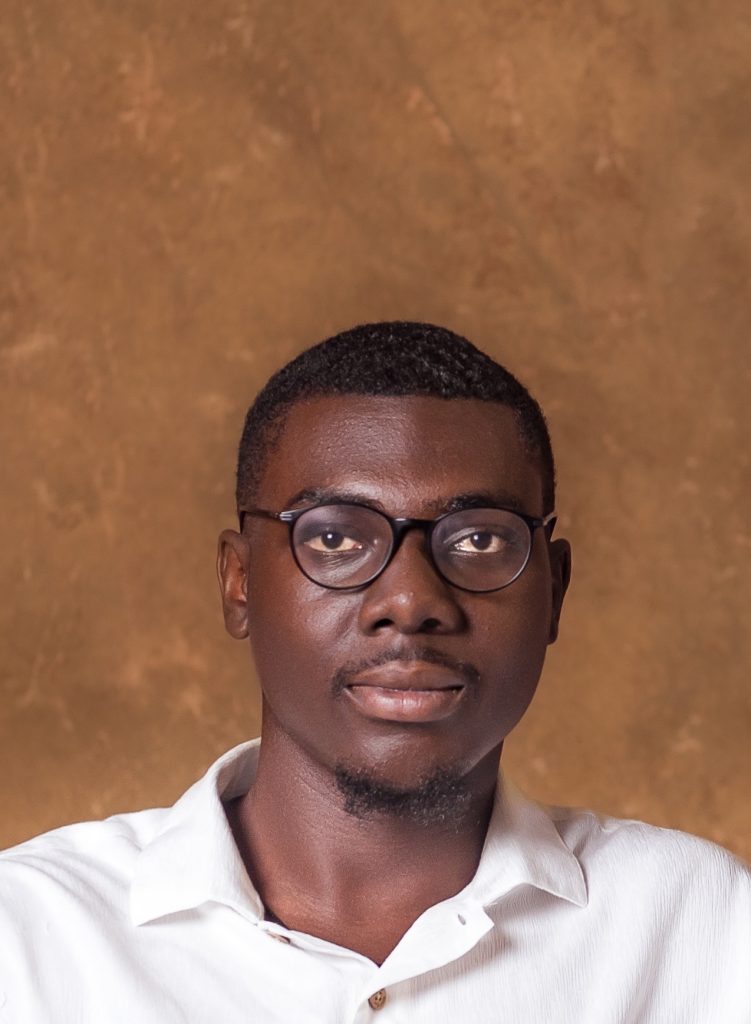
Ebenezer is the author of Jinjiri and I Am Terror, two action fantasy debuts that draw on Nigerian mythology and explore mental health struggles. He holds a BSc in Mechanical Engineering. Yet, he enjoys wandering through fictional worlds more than doing math. Since childhood, he’s been fascinated by Iron Man and Pennywise, inspiring him to create speculative fiction and comics. His stories blend thrilling adventures with emotional depth. Currently, he writes for Peda Comics and serves as Ufan Studio’s creative director. When not lost in world-building, he enjoys reading, watching movies, and sleeping – a bit too much.
Because great writing shouldn’t be hard to find. Subscribe to get the best reads in your inbox.

